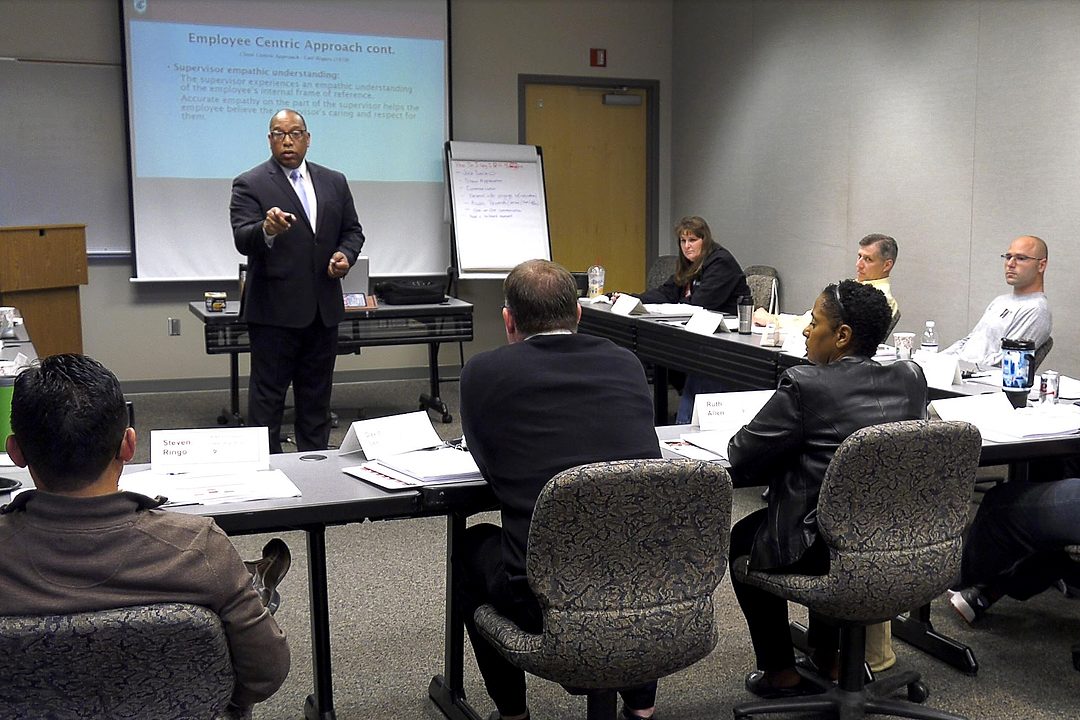
Home » Hanford contractors invest in leadership training
Hanford contractors invest in leadership training

September 12, 2019
Hanford contractors place an ongoing emphasis on growing employee leadership skills to bolster their talent pool and retain workers.
“Just like many employers across this country, we’re having a ‘silver tsunami,’ where a large part of our workforce is eligible for retirement in the next five to seven years,” said Todd Beyers, vice president of human resources for Mission Support Alliance, a contractor at the Hanford nuclear reservation. “So we’re not only focusing on how to attract new employees, but how to keep the ones we have.”
This includes leadership development, mentoring, team training, tuition reimbursement and even working with high school students to build a path for future employment at the site in Richland. “We are highly focused on future workers,” said Ty Blackford, president and chief executive officer of CH2M Hill Plateau Remediation Co. “Through our Highway to Hanford initiative, we promote opportunities within the local community to bring the next generation of workers to Hanford and enhance a healthy quality of life and diversity in our community. Our goal is to build a highway of talent to Hanford with an emphasis that develops partnerships with educational institutions, from K-12 to college level, focusing on science, technology, engineering and mathematics (STEM)/trade skills.”
Bechtel National offers access to a variety of leadership development options to employees across the company through its Bechtel University and Leadership Academy.
It also draws upon offerings via LinkedIn Learning. For example, all employees have access to training or resources for learning about forthright conversations, the dynamics of change and influencing without authority.
Bechtel’s supervisors and senior managers can access development courses in navigating a team through change, unconscious bias and coaching essentials. Courses are mostly offered online to provide access to Bechtel’s employees at projects and offices around the globe. Skills-based online courses are available on topics such as managing meetings, defining goals and decision making.
Darci Teel, a deputy vice president with MSA, has been impressed with her employer’s efforts to foster leadership.
Teel participated in an MSA program aimed at “high-potential” employees, providing her with additional leadership coaching and training.
“I had not been offered training like this for several years,” Teel said. “I was really offered several weeks, several sessions, and that has been one of the most positive things that I had done since Leadership Tri-Cities. It was probably the first thing that even compared to that.”
Leadership Tri-Cities is a yearlong community program that aims to educate leaders from a variety of job sectors about the community, offering sessions focused on agriculture, Hanford, human needs and services, law enforcement and justice, local and state government, medical and health services, education, arts and culture, and economic development.
Teel participated in the third class of the program, which celebrates its 25th year next year.
“MSA has taken the approach that if we invest in development, that’s one of the best things we can do,” Beyers said. “We have a philosophy that we provide opportunities to all employees, not only our senior or management employees, but employees at all levels. We have them look toward their future, regardless of whether they’re a new hire or part of our senior management team. We put equal emphasis on all of them.”
Beyers said the focus for MSA revolves around three questions: What employee would you like to be? What do our customers need now and in the future? How do you prepare yourself for success?
The company executes this focus through programs created internally and also with the help of an outside vendor.
“When we were designing all of these programs and initiatives, we wanted them to be an incubator for our talent resources in providing an environment to foster their growth and development,” said Julie Lindstrom, MSA’s director of staffing/diversity and development.
One of the internal programs is called STEPS, an acronym for “Supporting Talent and Engaging Professionals for Success,” which employees can apply to participate in, with the support of their direct manager.
Lindstrom said STEPS is a six-month program for employees to focus on growth as a future leader. “Each one of those participants is assigned a mentor from our high-potential employee program, all of which are managers and directors and going through their own program as well, to help guide them as they navigate through that journey. They go over a variety of things, from business acumen to people skills, a little bit of everything to help them be successful in their role,” she said.
So far, MSA has completed three rounds of the STEPS program and has a fourth underway, with 20 employees selected to participate each interval.
Washington River Protection Solutions offers a career development program called STAR, which stands for “Strategic Talent Advancement for Results.”
WRPS said the program “engages employees, promotes organizational learning, facilitates development of our workforce and prepares employees to fill positions within WRPS and corporate talent pipelines.”
WRPS said the STAR program is employee-driven and provides services in self-analysis, career exploration and educational goal-setting. Additionally, it offers the opportunity for employees to work with a mentor.
Formal and informal mentoring programs are the Hanford contractors’ most commonly-used practices to promote professional development.
“Through mentoring programs, we partner experienced employees with employees or projects for a specific reason,” Blackford said. “As an example, the Plutonium Finishing Plant recently developed and successfully implemented a mentoring program directed at new workers to increase their ability to safely perform demolition-related activities in a unique, high-hazard environment. This involved classroom training, field practice and on-the-job partnership and direct mentoring.”
The company uses mentoring to share knowledge and grow program participants, allowing those involved to “think of their career from new perspectives,” according to program materials.
CHPRC uses a development team to host workshops on important topics like resolving conflict in the workplace, increasing communication skills and having crucial conversations. Blackford said this all is an effort to build the skills of current and future leaders.
WRPS features a Talent Development Office dedicated to providing professional support, including career planning tools, job shadowing, virtual classes, study guides and a leadership lending library, and offers both internal and external guest speakers willing to discuss a variety of skills and issues.
Each company is invested in supporting education with both current and potential employees through financial support for continuing education or scholarships. MSA said it has provided nearly $1 million in scholarships since the start of its contract at the site.
Both CHPRC and WRPS offer tuition reimbursement programs or educational assistance for those looking to build their portfolio related to work being done at Hanford.
Teel said the training she received from her participation in leadership programs has extended beyond its initial expectation.
“We learned a lot from each other and basically developed our own leadership forum to continue to meet as leaders and to share lessons learned and ideas, and network, and to this day, there’s a group of us that continue to meet every other week for an hour. The networking on that has been very, very positive,” she said.
“Our employees are our greatest asset and treating them well is important for MSA, but also for the long-term success of Hanford,” Beyers said.
Local News Leadership Development
KEYWORDS september 2019




